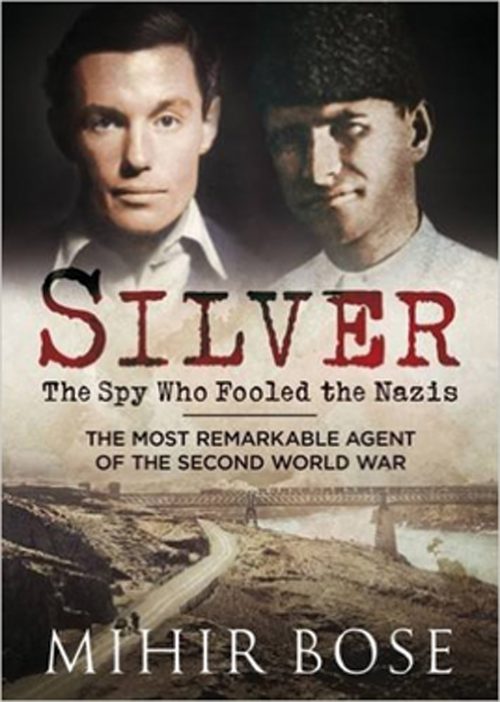The most dramatic stories of conflict in World War II revolve around the great battles of that time. While these great victories are undoubtedly awe-inspiring, they would not have been possible if not for the relentless and brave efforts of hundreds of covert agents who did their best to undermine the efforts of the enemy every step of the way.
Living difficult, dangerous, and oft-lonely lives of subterfuge, these covert agents were truly remarkable. But the most remarkable spy among them was a little-known Indian, code-named Silver.
The only quintuple spy of World War II, Silver (whose real name was Bhagat Ram Talwar) worked for the Germans, Italians, Japanese, Russians, and the British!

There was little written about the role played by Talwar, till author and journalist Mihir Bose recounted his exploits in the book Silver: The Spy Who Fooled the Nazis. Here’s the fascinating story of this master spy.
Born in 1908 in British India’s North-West Frontier Province, Talwar grew up in a wealthy family of Punjabi descent. His father, who had once been a friend of the British authorities, turned against colonial rule after the horrendous Jallianwala Bagh massacre of 1919. A little over a decade later, Talwar’s brother Hari Kishan was hanged by the British for attempting to assassinate the governor of Punjab.
Influenced by this and the example set by Bhagat Singh, Talwar too participated in revolutionary activities before pledging his allegiance to a faction of the Punjab-based communist movement called the Kirti Kisan Party. In 1941, he was tasked with smuggling a certain individual out of the British territory. The man was none other than Subhash Chandra Bose.
A series of adventures followed, with Bose masquerading as a deaf and dumb Muslim pilgrim, Mohammed Ziauddin, and Talwar pretending to be his secretary, Rahmat Khan.
After the original plan of reaching Moscow failed, the duo finally reached Berlin in April 1941 so that Bose could ask for Hitler’s help in freeing India from British rule.
It was here that Talwar had a moment of epiphany when he discovered his instinctive affinity for undercover operations. So when Bose introduced him to German diplomats as his Indian agent, it proved to be quite a fortuitous event for Talwar who seized the opportunity to become a spy for the Axis powers.
The Germans, marvelling at Talwar’s ability to ferret out hard-to-find information, gave him further training in espionage, a transmitter-receiver set, and paid him royally. His work involved travelling through tribal territory and dodging guards of both Britain and Afghanistan. In fact, by the end of the war, the Germans had paid him £2.5 million (in current monetary value) and honoured him with the Iron Cross, Nazi Germany’s highest military decoration.
However, what they did not know was that Talwar was fooling them on a grand scale. A communist at heart, he had no real desire to help the fascists. So he contacted the Russians in Kabul after Germany invaded the Soviet Union and became a triple agent, passing German intelligence on to Moscow.
Later, when Soviet Union entered into an unusual arrangement with Britain’s Special Operations Executive (SOE), Talwar began undertaking covert operation for Britain too. He was the only spy the Russians agreed to share.
Interestingly, his British control officer was Peter Fleming (the brother of the James Bond creator, Ian Fleming) and it was Fleming who gave him the codename Silver.
With Fleming’s help and the transmitter provided by the Germans, Talwar began broadcasting fictitious information daily from the gardens of Viceroy’s Palace in Delhi, to the German intelligence headquarters in Berlin. Later, when Germany began coordinating with Italy and Japan on military operations, he began providing false intelligence to the Italians and Japanese too.
By 1945, he had simultaneously spied for Britain, Russia, Germany, Italy and Japan, though his true loyalties lay with India and its domestic Communist Party. He was, in effect, a quintuple spy, probably the only such agent in modern times!
When the war finally ended in 1945, Talwar’s role came to an end too. After collecting a large British pay-off (adding to the money he had already received from the other nations), he disappeared into the wilderness of North West Frontier Province. He resurfaced only after Partition, returning to India and settling down in Uttar Pradesh, where he died in 1983.
A singularly shadowy figure, Talwar’s story was forgotten for decades till it was at last told in Mihir Bose’s The Indian Spy. And it is a story that deserves to be told. For nothing in the annals of Second World War spying comes close to what this Indian master spy did!
Also Read: Remembering Noor Inayat Khan, the Indian Spy Princess Who Died Fighting the Nazis
Like this story? Or have something to share? Write to us: contact@thebetterindia.com, or connect with us on Facebook and Twitter.
NEW: Click here to get positive news on WhatsApp!
If you found our stories insightful, informative, or even just enjoyable, we invite you to consider making a voluntary payment to support the work we do at The Better India. Your contribution helps us continue producing quality content that educates, inspires, and drives positive change.
Choose one of the payment options below for your contribution-
By paying for the stories you value, you directly contribute to sustaining our efforts focused on making a difference in the world. Together, let's ensure that impactful stories continue to be told and shared, enriching lives and communities alike.
Thank you for your support. Here are some frequently asked questions you might find helpful to know why you are contributing?

